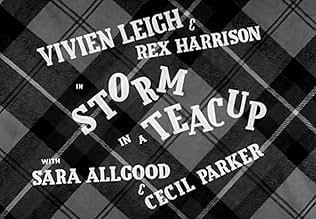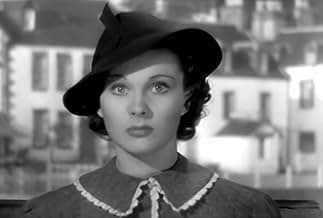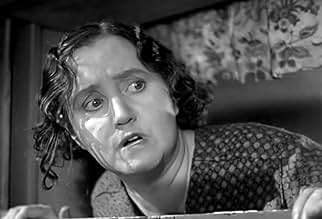IMDb RATING
6.5/10
1.3K
YOUR RATING
A local politician in Scotland tries to break the reporter who wrote a negative story about him, and who is also in love with his daughter.A local politician in Scotland tries to break the reporter who wrote a negative story about him, and who is also in love with his daughter.A local politician in Scotland tries to break the reporter who wrote a negative story about him, and who is also in love with his daughter.
Edgar K. Bruce
- McKellar
- (as Edgar Bruce)
Quinton McPherson
- Baillie Callender
- (as Quinton Macpherson)
Featured reviews
Why isn't this excellent comedy better known? More to the point, why is it so consistently misinterpreted? Most commentators view it as an amusing piece of froth about the provost of a small Scottish town (Cecil Parker) ordering that a dog be put down because its owner cannot pay for its licence. There's Vivien Leigh as the provost's daughter and Rex Harrison on top form as the journalist who makes the silly story national news. It's all very funny and delightfully played by all concerned. But underlying this story (adapted from a German play by James Bridie) is a subtle satire of dictatorship as was then current in Germany and Italy. Parker's role is very clearly based on Hitler, a times quite unsettlingly so, and it is in the bold but successfully intermingling of whimsy with dictatorial manners that the film gains its particular power. Cute it may seem to be, but Victor Saville was a wise and quite a subversive soul, and you'll find few other films from this period that so ably blend the dark with the light. Take a look at it again and see what I mean!
Rex Harrison portrays a newly arrived British journalist in Scotland who uses his new job at a newspaper to take on the local political bigwig in this pleasing British comedy. The unfortunate circumstance is that while he battles the politician, he happens to be falling in love with the politician's beautiful daughter, Vivian Leigh. The issue at hand is the life of a dog that Leigh's father has coldly ordered to be put to sleep. It seems that its owner could not afford a dog license. Dog lovers should enjoy one scene in particular where what seems to be hundreds of dogs of all shapes and sizes raid the politician's mansion.
This rarely-shown gem of a movie is a great early showcase for both Vivian Lee and Rex Harrison, before either became a famous star. It is also a prime example of a genre of movie that the British do very well and which Hollywood rarely ever touches: political satire. When Hollywood does try this sort of thing it us usually heavy-handed. Not so here. Everything is handled with a light touch, and it's all very "tongue-in-cheek".
Cecil Parker is the pompous and arrogant mayor of a small Scottish town, who is also running for a seat in Parliament (it's the sort of part in which Cecil Parker always excelled). While the mayor is busy being interviewed by a cub reporter on the local newspaper (Rex Harrison), the mayor hasn't time to be bothered with listening to the plea of an impoverished woman (the aptly-named Sara Allgood) whose dog had been impounded by the police for non-payment of it's license fee. Harrison decides to include the incident in his newspaper article, and events snowball from there.
"Storm in a Teacup" is exactly that, so don't expect "All the King's Men", "The Best Man", "Advise and Consent" or "Seven Days in May". However, it is very funny, and well worth a look if it should happen to come around again.
Cecil Parker is the pompous and arrogant mayor of a small Scottish town, who is also running for a seat in Parliament (it's the sort of part in which Cecil Parker always excelled). While the mayor is busy being interviewed by a cub reporter on the local newspaper (Rex Harrison), the mayor hasn't time to be bothered with listening to the plea of an impoverished woman (the aptly-named Sara Allgood) whose dog had been impounded by the police for non-payment of it's license fee. Harrison decides to include the incident in his newspaper article, and events snowball from there.
"Storm in a Teacup" is exactly that, so don't expect "All the King's Men", "The Best Man", "Advise and Consent" or "Seven Days in May". However, it is very funny, and well worth a look if it should happen to come around again.
Widowed Mrs. Hegarty (Sara Allgood), ice cream peddler residing in a fictive West Scottish coast village, Baikie, has as sole companion her dog Patsy, but after she neglects to pay an annual canine licensing fee, the Provost (Mayor) of Baikie, William Gow (Cecil Parker) commands that the animal be dispatched, thereby inciting the titular tempest, for which a young English journalist is largely responsible. He is Frank Burdon (Rex Harrison), recently arrived in Baikie to begin employment with its newspaper. "The Advertiser", and it is Frank's willfulness that brings trouble upon himself as well as for others. In spite of romantic mutual attraction between Frank and Gow's daughter Victoria (Vivien Leigh), the dauntless reporter is well pleased to find a strong human interest slant within Mrs. Hegarty's plight and composes a story that immediately is spread throughout Scotland, therewith effectively putting an end to Gow's political ambitions, as he was preparing to stand for a parliamentary post, an aspiration that has apparently gone a-glimmering due to the Patsy affair, with the Provost moved to exact redress from Burdon by suing him for slander, an action that summons the probability of a final break between Frank and Vickie Gow. The film is constructed upon a play, "Storm Over Patsy", written in 1930 by German expatriate to the United States Bruno Frank, who settled in Hollywood as a screenwriter. It was rephrased for its exhibition upon the American stage by Glaswegian James Bridie and mounted with a good deal of success during 1936 and 1937 upon Broadway, the production generally featuring vocative Allgood in addition to Leo G. Carroll as Willie Gow. The provincial complexion of Baikie is more clearly rendered upon the screen than the boards, and fortunately Alexander Korda supplies adequate funding to furnish what he intends as a "small" film with significant numbers of extras along with a gaily embellished mise-en-scène. A contemporaneous review of the picture by producer/director/critic Basil Wright, published in The Spectator, expanded the amiable film's popularity, and it has retained a following because of its colourful scenes and characters, but a viewer will make note as well of superb costuming and, as must be expected, a superior performance by Parker who handily annexes the acting laurels here.
I agree with most of the other reviews, but there's lots more brilliance that has not been mentioned. James Bridie take a very funny swipe at American 1930's slang (the new maid and a funny reply by the Lord Judge).
I don't think of this as being at all Capra-like. None of his films has this kind of snappy, clever satirical dialog.
I've come to really consider this film of the best British comedies of the 1930's.
The current (2013) DVD issue is part of "The Vivien Leigh Anniversary Collection" and is a really great print. Buy it and you'll see!
I don't think of this as being at all Capra-like. None of his films has this kind of snappy, clever satirical dialog.
I've come to really consider this film of the best British comedies of the 1930's.
The current (2013) DVD issue is part of "The Vivien Leigh Anniversary Collection" and is a really great print. Buy it and you'll see!
Did you know
- TriviaYoung Scots guy with a Glaswegian accent, who is Sir Rex Harrison's caddy, is a young Scottish actor called Jack Short (he didn't get a credit).
- GoofsDuring a break in the trial, when Victoria told her father that she is not married, Provost Gow exclaims that she committed perjury, and this is apparently his motive to drop the case. However, Victoria did not commit perjury. Although she made the marriage claim within the courtroom, she was not in the witness box and was not under oath, having not been sworn in by the court clerk.
- Quotes
Frank Burdon: The people of these islands are the most long-suffering in the world - they'll put up anything: they'll pull in their belts if they think it's their duty, they'll even go to the ends of the earth to be blown to bits if necessary. But there's two things they won't put up with - bullying and cruelty.
- Crazy creditsIn keeping with the Scottish setting, the opening credits are shown on various Scottish plaids.
- ConnectionsFeatured in Vivien Leigh: Scarlett and Beyond (1990)
- How long is Storm in a Teacup?Powered by Alexa
Details
- Runtime
- 1h 27m(87 min)
- Color
- Aspect ratio
- 1.37 : 1
Contribute to this page
Suggest an edit or add missing content


































